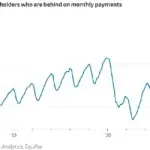Arbor Realty Trust (Arbor) has been experiencing rising delinquencies in its CLO department, this could be an early warning sign for other real estate investment trusts (REITs) in the market. Interest rate cuts may need to come sooner than expected.
CLO’s Explained
CLO’s, collateralized loan obligations, are predominantly leveraged loans that are securitized and managed as a fund. The assets in a CLO tend to be secured loans (collateral required) with the added benefit of priority of payment over other investors in the event of a default (insolvency). The priority of payment is delivered through tranches which are interest paying bonds at each level of the CLO along with a minor equity stake (typically).
Arbor’s Woes
Arbor’s troubles began in Q4 2023 when they started experiencing rising delinquencies in their CLO department. Delinquencies nearly doubled from September to October 2023 as borrowers of Arbor’s securitized debt began to feel the pain of making payments on their debt.
You see, in 2021 and 2022 Arbor’s loans helped fund an apartment boom from southern California to South Carolina and everywhere in between. When interest rates were lower, property owners (who borrowed from Arbor) were able to make the majority of payments; but with higher rates they have struggled to make payments on their floating-rate debt.
Arbor is now witnessing CLO debt delinquency (late 30 days or longer) of approx. 9%. Furthermore, nearly a quarter of borrowers were late on debt payments as of January 2024 as higher rates for longer has dealt a blow to borrowers of floating-rate debt. Although these are just the figures for Arbor, it’s likely that other REITs are suffering from the same predicament in their CLO departments.
Leave a Comment Cancel Reply
You must be logged in to post a comment.







